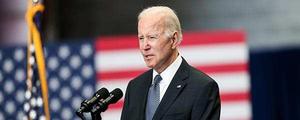I'm often asked about the value of national public opinion polling in an era of rigid political polarization and within a system where members of the U.S. House and Senate are elected at the district and state level, not in national elections. Certainly, polling keeps the people of the nation informed about each other and helps fulfill our natural interest in what others think and feel. But national polling is, or should be, important for the nation's elected representatives as well, as I will explain.
The ultimate direction for the American government's actions and policies arises from the people of the nation, not from a single ruler, autocrat or oligarchy. This by itself helps justify the importance of measuring what the people of the nation are thinking and feeling. But our system of government makes these types of considerations quite complicated. The Founders, while embracing the concept of democracy, were wary of its implications and set up an intermediary buffer between the people and their government -- our system of elected representatives. There has ever since been debate and discussion centered on exactly how this buffer between the people and policy decisions should operate. And a debate on just what should drive the decision-making of individuals we elect and send off to Washington.
Public Opinion and Government Representation
The process of representation thus has several layers. There is the base layer of the relatively small pool of people who vote in primaries and/or in general elections. There is the layer of all the people who live in a given representative's district or in a state. Finally, and I think, importantly, there is the overall layer of the population of the nation as a whole.
At the broad level, elected representatives are subject to reelection every two, four or six years. This in theory means their actions will reflect the wishes and opinions of the people they represent.
But elections are not foolproof mechanisms through which the voices of the people can be turned into policies and legislation that reflect their interests. The reasons for this are well understood and well researched. The percentage of the eligible voting population that votes in presidential elections usually hovers at the 60% level or below, and the percentage turnout in midterm elections is usually well below 50% -- although turnout was somewhat higher in 2018 and 2020.
Further, reflecting the nation's increasing political polarization, it is more and more the case that specific House districts and states are essentially controlled by one party. In 2020, for example, fewer than 15 out of the 50 states were considered bipartisan enough to be swing states. Current estimates are that after redistricting is completed, fewer than 40 of the nation's 435 House districts will be truly competitive. The election that counts for many representatives and senators is thus their party's primary. And the percentage of a given state or a given district's residents who vote in primary elections is usually even smaller than turnout in general elections. In these instances, in other words, voting control over what an elected representative does while in office is vested in a relatively small percentage of the residents they represent. And primary voters tend to pay attention to polarized media, meaning elected representatives who want to win their primaries must be increasingly sensitive to ideological voices, ideological elites and those who have platforms on ideologically focused media outlets.
This leads to interesting questions, most of which have been well debated in political science discourse. To what degree should representatives attempt to represent the views of their constituencies beyond the pool of voters who are important to their reelection? Which constituencies should matter as representatives make decisions about policies and cast votes?
The answers are not simple. For one thing, there are questions about the need for elected representatives to listen to the opinions of anybody, rather than just relying on their own judgment. The trustee model of government assumes that representatives should use their best judgment rather than attempting to reflect the judgments of others. English statesman and writer Edmund Burke exemplified this with his famous quote back in the 1700s, "Your representative owes you, not his industry only, but his judgment; and he betrays, instead of serving you, if he sacrifices it to your opinion."
Given Congress' dismal approval ratings today, the people at this point may well feel that representatives' judgment should be sacrificed. This in turn leads to the contrasting delegate model, which assumes that representatives' votes should reflect their constituents' views. This still leaves open the question of exactly which constituents' views should count.
Some argue that if legislators pay attention only to their own voters or constituents, the pluralistic process of legislative blending and compromise will ultimately match the overall common interests of the people of the nation as a whole. Others, myself included, argue that representatives need to broaden the scope of the bases of their decision-making. If representatives pay attention to narrow interests of relatively narrow groups of people, without much focus on the consequences for all the people, it helps produce the political polarization that grips the nation today -- with its intransigence, disinclination to compromise, vilification of those who hold opposing views, and legislative inaction.
These problems could be mitigated, at least in part, if representatives broaden their attention spans beyond narrow reference groups of primary voters or ideological elites. This would include taking into account the views of all the residents of representatives' districts or states, even if many of these residents do not vote. And I think, importantly, this would include being aware of and paying attention to the common interests as represented by the views of all the people nationwide, as a reference point or backdrop for decision-making. This of course leads to paying attention to national polls.
In any event, objective measures of the people's views of the way the representative system is working today suggest it has major problems. Congressional job approval is very low. Most measures show the people have low levels of confidence in Congress; the perceived ethics and honesty of members of Congress are at the bottom of the list, along with car salespeople and lobbyists; and the federal government as a whole has a highly negative image. Americans tell us that government and problems with government leadership constitute the most important problem facing the nation.
Polling's Role in Summarizing the Public's Views
Polling helps elected representatives be aware of and react to the opinions of all the people on the issues of the day -- the same people who currently hold their representatives in such relative disdain. If representatives take positions, make policy decisions and vote on legislation that goes contrary to the wishes of the national public, then they owe it to their constituents and to the nation as a whole to explain why they differ and why their (that is, the representatives') views and opinions are better or wiser than those of the people.
There is significant wisdom in the collective views of the people. Representatives would do well to understand these views and to assume that the people who are living in the real world on a daily basis have a good collective sense of what policies are needed and what policies will help improve their lives. In addition, Americans as a whole often have more moderate positions on issues than ideologues and partisans on either side of the political spectrum might assume. Those who hold extreme or rigid positions can help the process if they explain why their particular views differ from and are superior to the collective views of the people.
Polling has its own challenges, as those of us who do it for a living would be the first to admit. One challenge I hear about often is the idea that people are ill-informed and not in a position to hold opinions of value. The response to this canard gets at the heart of democracy. Our system is set up to allow all citizens to vote (with a few exceptions), without tests of knowledge or of the degree to which they pay attention to the candidates or to the issues. The assumption is that collectively, the votes of all the people have more value than any other system one can think of to direct their government. This holds true for measures of beliefs and opinions as well as for voting. The collective views of all the people blended together are at the base of our system of government.
There are certainly methodological challenges with polling in today's changing environment, but the good news is that these are being continually addressed by polling practitioners. There is the also important challenge inherent in the effort to review and synthesize disparate polling on any specific issue topic, particularly when different polls ask about topics using different approaches and question wording. But this is not an insurmountable problem. Medical professionals have similar challenges when they attempt to synthesize a great deal of complicated and sometimes contradictory research on any given medical condition in order to make decisions on appropriate diagnoses and health recommendations. A shining example of how this can be handled comes from the U.S. Preventive Services Task Force, which "works to improve the health of people nationwide by making evidence-based recommendations about clinical preventive services." In similar fashion, pollsters work to improve the wellbeing of people nationwide by taking on the challenge of making evidence-based assessments of the collective will of the American people.
Assessing public opinion on the key policy issues of the day, in the end, can and should provide value in our representative democracy. We should have more, rather than less, assessment of national public opinion, and representatives should pay more, rather than less, attention to it. Representatives gain insight when they understand the views of all the people of the country, even if they want to dismiss these views, take contradictory policy positions or pay attention only to primary voters, party leaders or ideologically biased media figures. The need for an objective assessment of national public opinion is particularly vital in our time of rabid political polarization.




